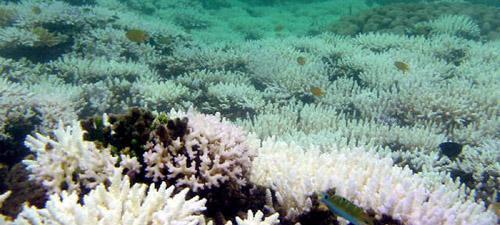 |
(Photo: The Nation) |
"We will give the coral reefs time to recover naturally," Sunan Arunnopparat, directorgeneral of the National Parks, Wildlife and Plant Conservation Department, said yesterday (Janaury 20).
More than 80 per cent of the coral in the areas were suffering from bleaching, he said, adding that the suspension of diving activities was introduced in consultation with academics.
The places to be made offlimits to visitors include Chuak Island of Chao Mai Beach National Park in Trang; Bulone Mai Pai and Bulone Rang Pheung Islands of Petra Islands National Park in Satun; Takiang Island, Hin Ngam Island, Rawi Island, Sai Khao Beach and Dong Island of Tarutao National Park in Satun; and Maphrao Island of Chumphon Islands National Park.
In Phang Nga, the sites are Hin Klang of Nopparat TharaPhi Phi Islands National Park; Suthep Bay, Mai Ngam Bay, Stork Island, Hin Kong and Pakkad Bay of Surin Islands National Park (coral reef area in front of the national park office); and Fai Wap Bay and Eve of Eden of Similan Islands National Park.
Sunan said the whitening is caused by various factors such as El Nino, chemicals, changes in coastal conditions and disruptive human activities.
"Coral reefs can recover from bleaching if the sea conditions turn fine. We should suspend diving activities to reduce pollution," he said.
The department would also adopt other measures such as limiting admissions to national parks and campaigning to make tourists more conscious of the environment.
Tourism operators in southern Thailand, where most of the dive sites are located, voiced opposition to the department's latest move.
Torpong Wongsathienchai, whose company offers diving tours to Similan Islands and Surin Islands in Phang Nga, said authorities were not aiming at the root problem.
"The move will hardly be useful. In fact, national marine parks have been closed to tourists for about six months out of the year all along," he said.
Authorities should implement strict measures to reduce oil spills from boats and promote environmentally responsible tourism, he said.
"When you close diving sites, you must think about the whole impact on the tourism industry. What about hotel operators? Will they get any guests?" he said.
If the hotel business was depressed, employees would face dire consequences too, he added.
Thawat Niranartwarodom, owner of the Bayfront Khao Lak Resort and Spa, said most travellers came to the Andaman Sea because they want to explore the marvellous snorkelling attractions.
"When we sell them tour packages, we show them our beautiful seas and islands. What will they say if they find they can't visit the places being advertised?" he asked.
Authorities should educate tour guides on how best to protect the environment instead of slapping a blanket ban on prime diving destinations, he added.
(The Nation, a member of ANN)
[한글 요약]
태국 정부는 자국에 있는 국립해양공원에 위치한 스쿠버 다이빙 지역을 오는 1월 21일부터 한 달간 해저 내의 산호탈색 현상(coral bleaching)을 막기 위해 관광객들을 통제하기로 하자, 여행 업계의 반발을 사고 있다.
해양공원 지역 내의 산호초 중 80퍼센트 이상이 탈색 현상을 보임에 따라관련 연구소와 협력하여 정부는 이번 금지령 조치를 내렸다.
산호탈색 현상은 엘니뇨, 화학 현상, 해안 기후의 변화 그리고 해양에 미치는 인간의 파괴 행위에 의해 발생한다. 이와 함께 관계자는 바다의 오염을 최소화 하기 위해 다이빙 활동은 금지해야 한다고 밝혔다. 또한 환경의 소중함을 인식시키기 위하여 관광객들의 국립공원 입장과 사람들의 접근을 일제히 통제하는 방안도 검토 중에 있는 것으로 알려졌다.
하지만 이에 대한 반론의 목소리도 만만치 않다. 대부분의 다이빙 지역이 밀집해 있는 태국 남부 지역의 여행 업체들은 정부의 조치에 크게 반발하고 나섰다.
한 여행 업체 관계자는 '정부가 근본적인 문제부터 해결하려는 의지를 보이지 않고 있다' 며, 정부의 조치의 실효성에 의문을 제기하면서 이번 조치로 태국의 여행 산업의 타격이 불가피하다고 밝혔으며 이로 인하여 호텔의 여행객도 뜸해질 것이라고 우려를 표했다. 이와 함께 정부는 선박에서 배출되는 기름 유출을 최소화 하면서 친환경적인 여행 산업 발전에 힘을 쏟아야 한다고 주장했다.
한 호텔 업체 관계자는 “직접 스노컬링 현장을 찾아 오는 관광객들이 대부분이다”라면서, “단지 우리는 호텔 패키지를 판매하고 있을 뿐이며, 이를 통해 아름다운 바다와 섬을 보여주려고 할 뿐이다. 만약 관광객들이 우리가 홍보했던 곳에 발을 들여놓지 못한다면 어떻겠느냐?”며 정부의 정책에 크게 반발하였다. “그리고 정부는 이번 금지 조치를 철회하고 오히려 현지 여행 가이드에게 환경을 보호할 수 있는 대책을 가르쳐야 한다며 언성을 높였다.







